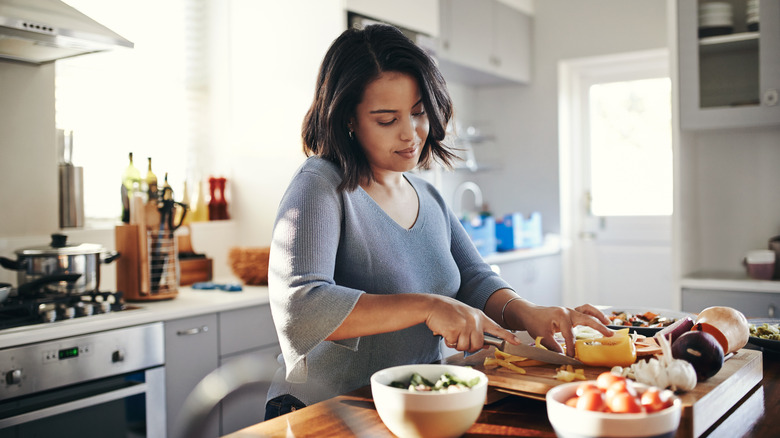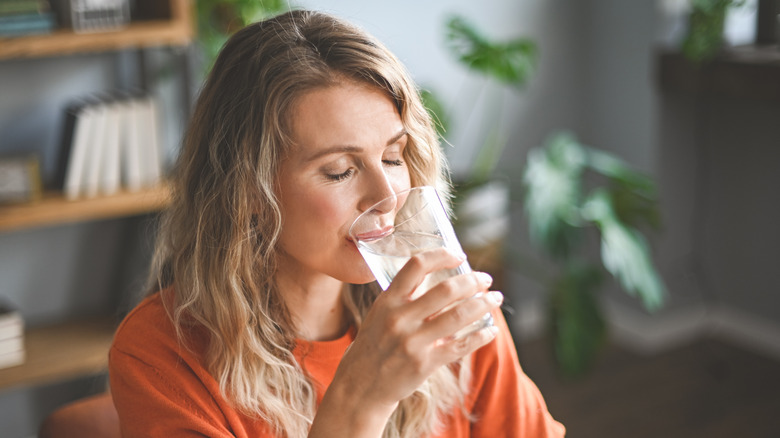The Number One Thing You Can Do To Prevent Kidney Stones
People probably don't think about getting kidney stones unless they know someone struggling with passing a kidney stone — or until they have one themself. Kidney stones are pretty common, affecting one in 500 people in the United States every year, according to the University of Florida's College of Medicine. Your urine typically has crystals of minerals to help rid your body of excess minerals in your diet. For some people, these crystals grow larger and stay in the kidneys rather than pass through the urinary system. When the stone eventually passes through their system, it can be quite painful.
While anyone can develop a kidney stone, people who have family members with kidney stones are more likely to have kidney stones. Diets high in red meat and sodium also put you at a higher risk for kidney stones. Dehydration can cause kidney stones because it makes your urine more concentrated. A low amount of urine can make it difficult for the crystals to dissolve in your kidneys. Drinking more water is the number one method to prevent kidney stones.
Hydrating properly to reduce the risk of kidney stones
Guzzling a ton of water all at once probably isn't the best strategy to stay hydrated. The American Physiological Society says your body will see this as overhydrating and you'll find yourself running to the bathroom. Instead, it's best to sip a little bit of water at a time throughout the day and drink while you're eating meals.
You don't have to stick to water. Adding natural lemon or a powder with citric acid makes plain water more palatable, and the citric acid can block the formation of certain types of kidney stones. On hot, humid days, it's easy to get dehydrated from excess sweating. A sports drink might taste great and provide electrolytes, but many sports drinks can be overloaded with sodium, which is a no-no when it comes to preventing kidney stones.
Remember that you can also hydrate through fruits and vegetables. Eating a cup of watermelon is similar to drinking a cup of water because it's 91% water, and watermelon contains calcium, magnesium, and potassium for electrolytes. Another helpful fruit that's more hydrating than watermelon is often believed to be a vegetable — the tomato. A cup of grape tomatoes is almost 93% water.
Other methods to prevent kidney stones
Proper hydration is the best way to lower your risk of kidney stones, but you can make other changes to keep stones from forming. One method is to reduce your sodium intake. That means putting away the salt shaker, because a teaspoon of salt puts you almost at your daily recommended maximum for sodium. It's easy to control sodium intake at home, but restaurant foods are often high in sodium. Onion rings from Applebee's or an order of vegetable lo mein put you well over your sodium limit for the day.
Calcium oxalate stones are the most common type of kidney stone, so people who are prone to kidney stones might consider reducing oxalates from their diet. Oxalates are found in many foods such as nut butter, soy milk, blueberries, pretzels, and spinach. This might lead you to believe you should also cut calcium from your diet. Instead, you should increase how much calcium you eat so the calcium binds to whatever oxalates are in your diet. Adding more calcium will help rid your body of excess oxalate.
Another common kidney stone is a uric acid stone, which forms when your diet is rich in purines. This chemical compound found in many foods makes your urine more acidic and forms kidney stones. Purines are found in organ meats, game meats, red meats, sardines, alcohol, and high fructose corn syrup.


